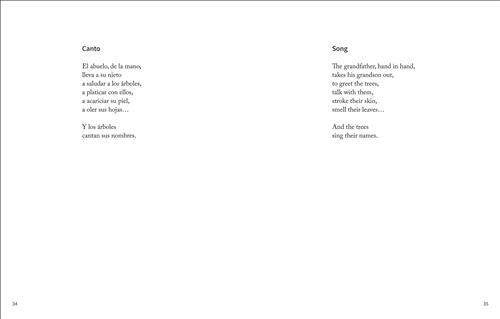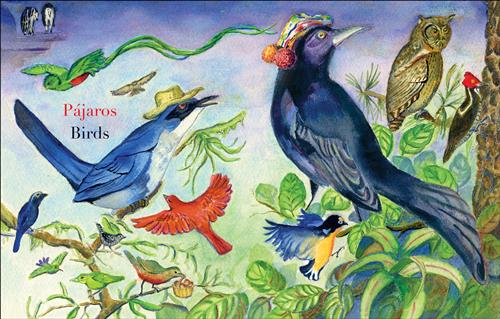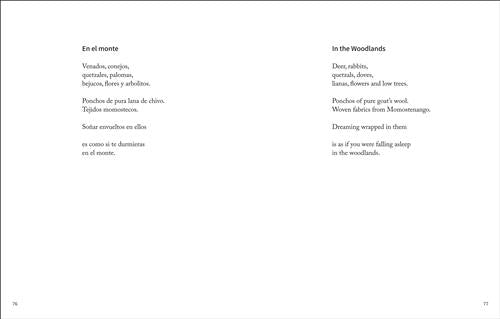A collection of poetry by one of the greatest Indigenous poets of the Americas about the vanished world of his childhood — that of the Maya K’iche’.
Aquí era el paraíso / Here Was Paradise is a selection of poems written by the great Maya poet Humberto Ak’abal. They evoke his childhood in and around the Maya K’iche’ village of Momostenango, Guatemala, and also describe his own role as a poet of the place.
Ak’abal writes about children, and grandfathers, and mothers, and animals, and ghosts, and thwarted love, and fields, and rains, and poetry, and poverty, and death.
The poetry was written for adults but can also be read and loved by young people, especially in this collection, beautifully illustrated by award-winning Guatemalan-American illustrator Amelia Lau Carling.
Ak’abal is famous worldwide as one of the great contemporary poets in the Spanish language, and one of the greatest Indigenous poets of the Americas. Ak’abal first composed his poems in K’iche’ in his mind before writing them down in Spanish.
Key Text Features
foreword
biographical information
poems
translation
Correlates to the Common Core State Standards in English Language Arts:
CCSS.ELA-LITERACY.RL.4.2
Determine a theme of a story, drama, or poem from details in the text; summarize the text.
CCSS.ELA-LITERACY.RL.5.4
Determine the meaning of words and phrases as they are used in a text, including figurative language such as metaphors and similes.
CCSS.ELA-LITERACY.RL.5.5
Explain how a series of chapters, scenes, or stanzas fits together to provide the overall structure of a particular story, drama, or poem.
CCSS.ELA-LITERACY.RL.5.7
Analyze how visual and multimedia elements contribute to the meaning, tone, or beauty of a text (e.g., graphic novel, multimedia presentation of fiction, folktale, myth, poem).
CCSS.ELA-LITERACY.RL.6.2
Determine a theme or central idea of a text and how it is conveyed through particular details; provide a summary of the text distinct from personal opinions or judgments.
CCSS.ELA-LITERACY.RL.6.5
Analyze how a particular sentence, chapter, scene, or stanza fits into the overall structure of a text and contributes to the development of the theme, setting, or plot.
A collection of poetry by one of the greatest Indigenous poets of the Americas about the vanished world of his childhood — that of the Maya K’iche’.
Aquí era el paraíso / Here Was Paradise is a selection of poems written by the great Maya poet Humberto Ak’abal. They evoke his childhood in and around the Maya K’iche’ village of Momostenango, Guatemala, and also describe his own role as a poet of the place.
Ak’abal writes about children, and grandfathers, and mothers, and animals, and ghosts, and thwarted love, and fields, and rains, and poetry, and poverty, and death.
The poetry was written for adults but can also be read and loved by young people, especially in this collection, beautifully illustrated by award-winning Guatemalan-American illustrator Amelia Lau Carling.
Ak’abal is famous worldwide as one of the great contemporary poets in the Spanish language, and one of the greatest Indigenous poets of the Americas. Ak’abal first composed his poems in K’iche’ in his mind before writing them down in Spanish.
Key Text Features
foreword
biographical information
poems
translation
Correlates to the Common Core State Standards in English Language Arts:
CCSS.ELA-LITERACY.RL.4.2
Determine a theme of a story, drama, or poem from details in the text; summarize the text.
CCSS.ELA-LITERACY.RL.5.4
Determine the meaning of words and phrases as they are used in a text, including figurative language such as metaphors and similes.
CCSS.ELA-LITERACY.RL.5.5
Explain how a series of chapters, scenes, or stanzas fits together to provide the overall structure of a particular story, drama, or poem.
CCSS.ELA-LITERACY.RL.5.7
Analyze how visual and multimedia elements contribute to the meaning, tone, or beauty of a text (e.g., graphic novel, multimedia presentation of fiction, folktale, myth, poem).
CCSS.ELA-LITERACY.RL.6.2
Determine a theme or central idea of a text and how it is conveyed through particular details; provide a summary of the text distinct from personal opinions or judgments.
CCSS.ELA-LITERACY.RL.6.5
Analyze how a particular sentence, chapter, scene, or stanza fits into the overall structure of a text and contributes to the development of the theme, setting, or plot.
| Published By | Groundwood Books Ltd — Aug 1, 2021 |
| Specifications | 172 pages | 6.5 in x 8.3125 in |
| Keywords | Indigenous literature; nature writing; poems; Works in translation; world literature; imagery; imagining; visualizing; Common Core aligned; CC Literature Key Ideas and Details; CC Literature Craft and Structure; CC Literature Integration of Knowledge and Ideas; grade 4; grade 5; grade 6; Américas Award; poetry; |
| Written By |
HUMBERTO AK'ABAL was born in the Maya K’iche’ village Momostenango in Guatemala in 1952. He worked as a blanket weaver (one of the activities for which Momostenango is renowned,) a shepherd, a sweeper, then a garment maker in a maquila in Guatemala City. When he was thirty-eight, he published his first book of poetry. Ak’abal is famous worldwide as one of the great contemporary poets in the Spanish language, and one of the greatest Indigenous poets of the Americas, having written over twenty-five books. He died in January 2019, leaving his widow, Mayulí Bieri, and son Nakil Ak’abal Bieri. |
| Illustrated by |
AMELIA LAU CARLING was born and brought up in Guatemala. Her parents' store sold the thread used by many Maya weavers in their extraordinary work. She was, therefore, in constant contact with Maya culture and creators from an early age. She is the author-illustrator of the celebrated books Alfombras de Aserrín(Sawdust Carpets) and La tienda de Mamá y Papá (Mama and Papa Have a Store) — winner of the Américas Award and the Pura Belpré Award for Illustration— and the illustrator of numerous other books. Though she now lives in the United States, she returns to Guatemala frequently. |
| Edited by |
PATRICIA ALDANA was born and brought up in Guatemala. She came to Canada as an adult and founded Groundwood Books, of which she was the publisher for thirty-five years. |
| Written By |
|
HUMBERTO AK'ABAL was born in the Maya K’iche’ village Momostenango in Guatemala in 1952. He worked as a blanket weaver (one of the activities for which Momostenango is renowned,) a shepherd, a sweeper, then a garment maker in a maquila in Guatemala City. When he was thirty-eight, he published his first book of poetry. Ak’abal is famous worldwide as one of the great contemporary poets in the Spanish language, and one of the greatest Indigenous poets of the Americas, having written over twenty-five books. He died in January 2019, leaving his widow, Mayulí Bieri, and son Nakil Ak’abal Bieri. |
| Illustrated by |
|
AMELIA LAU CARLING was born and brought up in Guatemala. Her parents' store sold the thread used by many Maya weavers in their extraordinary work. She was, therefore, in constant contact with Maya culture and creators from an early age. She is the author-illustrator of the celebrated books Alfombras de Aserrín(Sawdust Carpets) and La tienda de Mamá y Papá (Mama and Papa Have a Store) — winner of the Américas Award and the Pura Belpré Award for Illustration— and the illustrator of numerous other books. Though she now lives in the United States, she returns to Guatemala frequently. |
| Edited by |
|
PATRICIA ALDANA was born and brought up in Guatemala. She came to Canada as an adult and founded Groundwood Books, of which she was the publisher for thirty-five years. |
| Audience | ages 9 and up / grades 4 and up |
| Key Text Features | foreword; biographical information; poems; translation |
| Common Core |
CCSS.ELA-LITERACY.RL.6.5
CCSS.ELA-LITERACY.RL.5.4 CCSS.ELA-LITERACY.RL.6.2 CCSS.ELA-LITERACY.RL.5.5 CCSS.ELA-LITERACY.RL.4.2 CCSS.ELA-LITERACY.RL.5.7 |
Commended, Cooperative Children's Book Center, CCBC Choices, 2022
Commended, Bank Street College of Education Best Children's Books of the Year, 2022
Commended, Bank Street College of Education Best Children's Books of the Year, 2022
“An excellent addition to poetry collections for youth, sure to also find fans among adult readers.” — School Library Journal, STARRED REVIEW
“Beautiful imagery ushers readers into a complex conversation.” — Kirkus Reviews
“Vital and refreshing.” — Toronto Star
“[A] closely observant and at times mischievous ode to the small moments and details in quotidian life.” — Booklist
“[T]o be savored and ruminated upon.” — CM: Canadian Review of Materials
“Lovers of poetry will delight in perusing the pages of this book.” — Winnipeg Free Press
“The kind of poetry collection that will alter a young reader in the profound way that only fine books can.” — Miramichi Reader




